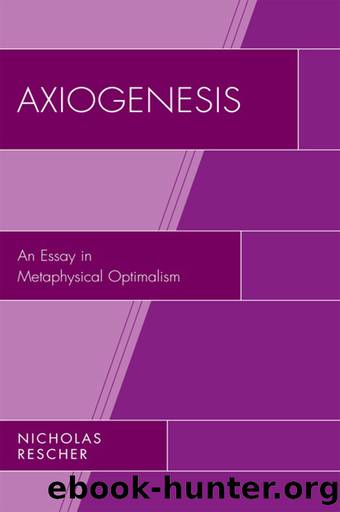Axiogenesis by Rescher Nicholas;

Author:Rescher, Nicholas; [Rescher, Nicholas]
Language: eng
Format: epub
ISBN: 662337
Publisher: Lexington Books/Fortress Academic
Now, to be sure, matters can indeed be improved upon locallyâany one of these X-occupied positions could in theory accommodate an A. But globally matters could not be improved upon. Any attempt to replace an X by an A would impel matters into an inferior result overall. The fact that this or that particular local imperfection could be improved upon does not mean that the overall condition of things would benefit thereby. It is all a matter of how those local changes interact with and ramify over the larger conditions of things.
World optimization is always maximization under various existential constraints imposed by the taxonomic nature of the things whose realization is being contemplated. And such constraints mean that while the world may well be as good as it can be as a wholeâthat is, is aggregatively merit-maximizingânevertheless it is not correspondingly merit-maximizing in its parts taken distributively. The condition of many of these parts is far from optimal and can certainly be improved. It is just that the merit of the parts is so interconnected and intertwined that improvement in one area is bound to carry with it diminution in another.
We shall characterize as a âteeter-totter conditionâ any arrangement where an improvement in regard to one aspect can only be achieved at the cost of worsening matters in another respect. Whenever two inherently positive factors (like familiarity and novelty) are locked into such a teeter-totter relationship, we cannot have it both ways. Whenever this situation is in play, it stands decisively in the way of absolute perfection.
Whenever the overall merit of a complex whole requires a harmonization among different and systematically competitive aspects of merit, it makes no sense to require perfection (i.e., maximization with respect to every aspect of merit). We will have to settle for optimizationâthe optimal harmonization among those different aspects represented by their holistically best-achievable overall combination. Accordingly, optimalism emphatically does not demand that everything must be perfectâit only requires that things be as perfect as the circumstances of their situation permit.
Changes to the existing order of things do not come cost-free. Could Homo sapiens be improved by yet another pair of eyes at the back of the head? Presumably not. The redesign of this biosystem could not be effected without incurring additional vulnerabilities. And the mechanisms for processing the additional information provided would involve added complications that would doubtless not be cost-effective in added benefit. Nature has doubtless seen to it that we are as well-adjusted to our bioniche as the worldâs fabric of natural law permits. And there is no reason to refrain from seeing this sort of situation replicated on a cosmic scale.
This line of thought vividly indicates how it can transpire that âfixingâ local imperfections can readily fail global optimality. The medieval schoolmen inclined to look on perfection as a matter of completeness. For them, âperfectâ and âwholeâ were virtually identical concepts.24 However, they went on to insist that a perfect whole need not be perfect in each of its constituent aspects, and that increasing the perfection of some aspect will throw the whole out of balance.
Download
This site does not store any files on its server. We only index and link to content provided by other sites. Please contact the content providers to delete copyright contents if any and email us, we'll remove relevant links or contents immediately.
The remains of the day by Kazuo Ishiguro(8999)
Tools of Titans by Timothy Ferriss(8394)
Giovanni's Room by James Baldwin(7346)
The Black Swan by Nassim Nicholas Taleb(7129)
Inner Engineering: A Yogi's Guide to Joy by Sadhguru(6794)
The Way of Zen by Alan W. Watts(6614)
The Power of Now: A Guide to Spiritual Enlightenment by Eckhart Tolle(5781)
Asking the Right Questions: A Guide to Critical Thinking by M. Neil Browne & Stuart M. Keeley(5775)
The Six Wives Of Henry VIII (WOMEN IN HISTORY) by Fraser Antonia(5515)
Astrophysics for People in a Hurry by Neil DeGrasse Tyson(5189)
Housekeeping by Marilynne Robinson(4447)
12 Rules for Life by Jordan B. Peterson(4304)
Ikigai by Héctor García & Francesc Miralles(4274)
Double Down (Diary of a Wimpy Kid Book 11) by Jeff Kinney(4272)
The Ethical Slut by Janet W. Hardy(4251)
Skin in the Game by Nassim Nicholas Taleb(4248)
The Art of Happiness by The Dalai Lama(4130)
Skin in the Game: Hidden Asymmetries in Daily Life by Nassim Nicholas Taleb(4006)
Walking by Henry David Thoreau(3962)
